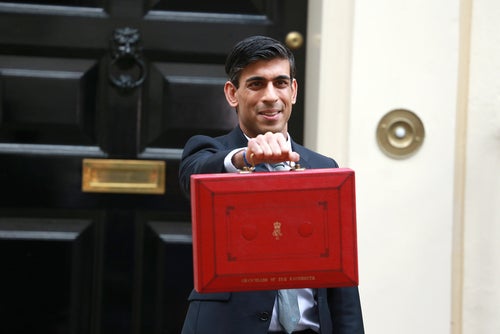
Small businesses are the lifeblood of the asset finance community, and UK leasing companies are wondering how the government’s plan to get cash flowing to SMEs again – after a bout of Covid-19 – will pan out. Alejandro Gonzalez investigates.
-O-
March saw Boris Johnson’s government throw a lifeline to small businesses in fear for their survival as Covid-19 infected the UK economy, but this intervention – as welcome as it is by some industry stalwarts – also has its critics.
The fear is not that the cost on the public purse may prove large – that is a given – but that the emergency credit initiative may prove too cumbersome and risky for those expected to arrange the financing.
For hundreds of leasing brokers and asset finance companies across the UK, SMEs are the backbone of their business, and for thousands of small business owners afflicted with coronavirus, the immediate need is for cash to meet outgoings.
Julian Rose, director of Asset Finance Policy, said there was unlikely to be demand for asset finance in the short term: “Right now the urgent need is for cash loans, and only as we get through this will the demand for asset finance increase. So there’s a little bit of a time window for firms, that are keen to participate, to start the application process and be ready to lend when the demand for asset finance hopefully picks up again.”
How well do you really know your competitors?
Access the most comprehensive Company Profiles on the market, powered by GlobalData. Save hours of research. Gain competitive edge.

Thank you!
Your download email will arrive shortly
Not ready to buy yet? Download a free sample
We are confident about the unique quality of our Company Profiles. However, we want you to make the most beneficial decision for your business, so we offer a free sample that you can download by submitting the below form
By GlobalDataWithout cash flow, thousands of small businesses across the UK will face the prospect of laying off their staff and closing their doors permanently.
A survey by invoice finance specialist MarketFinance – of 5,000 business owners employing under 250 staff, conducted between 20–22 March – found that more than two-thirds believed they would run out of cash before Easter.
Anil Stocker, chief executive at MarketFinance, said: “Business owners are uncertain on revenue numbers for this year with a third expecting at least a 50% drop in sales and, rightly, weary of taking on more loans that they might not be able to pay back.”
To get the funds to where they are needed, the government loaded the Spring Budget with a Covid-19 scheme for ailing SMEs, the newly unveiled Coronavirus Business Interruption Loan Scheme (CBILS).
One advocate of the scheme is the 140-year-old merchant bank Close Brothers Group, which does the majority of its business in the UK.
On the vastness and urgency of the government SME bailout, Neil Davies, chief executive of Close Brothers Asset Finance, said: “There’s never been a harder time to do this, and there’s never been a more important time to do it.”
One such applicant is Close Brothers. Davies added: “The bank has had an application in for some time and we are hopeful of an early approval so that we can help our customers.”
But other figures in the leasing and asset finance industry, who were not prepared to speak on the record, have expressed concerns that government’s SME rescue scheme – in its current state – may not be up to the job of channelling funds quickly or efficiently enough to small business.
The path to CBILS
This story began with a virus that has changed life as we know it in just a few short weeks, prompting Rishi Sunak, the Chancellor of the Exchequer, to unveil an ambitious spending programme in his mid-month Budget 2020 – the first of at least four major budget announcements he was to make in March.
Sunak recognised what was staring us in the face, that UK businesses – from the sole trader to the publicly listed company – were quickly running out of cash, as the virus was scaring off customers resulting in business revenues collapsing.
Sunak – an MP since 2015 and in the No.11 job for less than four weeks – addressed the House of Commons on 11 March. His mission: to rescue the economy from collapse.
His business package, he said, would “unlock up to £1bn of attractive working capital loans to support small businesses, with more as needed.”
Sunak called his Covid-19 spending package to support businesses, households and the National Health Service from coronavirus “one of the most comprehensive economic responses of any government anywhere in the world.”
Along with the spending on the ‘levelling-up’ part of the Budget, the total spend came to £30bn.
By the end of the month, his budget spending to safeguard the economy had multiplied more than tenfold to £330bn, mostly in government loan guarantees.
The bulk of this amount is earmarked for large companies through offers of short-term bonds with maturities of between a week and a year (the Covid Corporate Financing Facility, CCFF, will be led by the Bank of England).
Funding SMEs
The aid package for SMEs will come from the state-owned British Business Bank (BBB), which was established in the wake of the 2008 financial crisis.
The BBB has as its mission: “to make finance markets work better for small businesses in the UK at all stages of their development: starting up, scaling up and staying ahead.”
Lindsay Town, chief executive at IAA-Advisory commented about the bank: “The BBB set its stall out early on to support the leasing sector and is a very good friend of the industry. It can, in line with many ‘central programmes’ be a little more cumbersome to navigate through for smaller players with less developed operational systems.”
The BBB says it achieves its aims, not by lending or investing directly in businesses, but instead by working “with over 130 partners such as banks, leasing companies, venture capital funds and web-based platforms.”
One of the BBB’s existing schemes, the Enterprise Finance Guarantee (EFG), was identified by Sunak as a “temporary” vehicle on which to base its Covid-19 funding, renamed CBILS.
Like the EFG, the CBILS scheme will facilitate what most SMEs need: revolving credit and term loans. Asset finance and invoice finance are also on tap via CBILS.
The BBB said: “SMEs experiencing lost or deferred revenues, leading to disruptions to their cashflow are eligible for £5m in funding, available on repayment terms of up to six years.”
Terms and eligibility
The government took the EFG scheme and made its terms more generous for distressed borrowers, who had to be UK-based and manage an annual turnover of no more than £45m to access the scheme.
In a statement, the BBB said: “Unlike under EFG, the government will not charge businesses or banks for using the programme. We will also be guaranteeing a greater proportion of the lenders’ facilities, giving them greater confidence to provide facilities to small businesses.”
And so it came to pass. Under CBILS, the government said it would act as a guarantor on 80% of the debts if the money is not repaid, in the hope of encouraging lenders to offer SMEs credit lines they may not have supported otherwise.
Another incentive came in the way of fees. The 2% fee levied on SMEs to use the EFG, to cover costs, would, in the case of the CBILS, be covered by the government.
And there was more. “The Government will also cover the first 12 months of interest payments, so businesses will benefit from lower initial repayments,” the BBB said.
By the end of the month, when the details of the scheme were finalised, the most any one borrower could take out as a loan had been capped at £5m (this had increased from £1.2m, as suggested in the chancellor’s initial announcement).
Similarly, Sunak’s original budget for CBILS programme was capped at £1.2bn, but by the end of March this ceiling had been lifted, with borrowing now to be “demand-led,” the BBB said.
Borrowers’ concerns
A key concern raised by borrowers is risk. Business owners are worried that lenders are demanding security to cover their 20% exposure before an emergency loan can take place.
The BBB said: “At the discretion of the lender, the scheme may be used for unsecured lending for facilities of £250,000 and under.
“For facilities above £250,000, the lender must establish a lack or absence of security prior to businesses using CBILS. If the lender can offer finance on normal commercial terms without the need to make use of the scheme, they will do so.”
In a press release about CBILS and the benefits of alternative lending, Anil Stocker of MarketFinance said: “It’s important to realise that in the fine print, many banks will ask for additional security and personal guarantees for loan amounts greater than £250,000 of borrowings.”
This state of affairs for SMEs prompted the British Chambers of Commerce (BCC) to write to the UK’s top bank chief executives urging them to show the depth of their commitment to SMEs “through the swift implementation of CBILS”.
Adam Marshall, director-general of the BCC, also asked bank bosses to make public their commitment to the government’s Covid-19 scheme and the targets they have set their teams, and to publish: their lending criteria (including their expectations on personal guarantees); the terms for any unsecured lending (below £250k), and data on how quickly they are processing applications.
In the days that followed, UK Finance, the trade body for British banks, issued the reminder: “Lenders may require security for the facility.”
“Primary residential property cannot be taken as security under the scheme” the BBB said.
This means that, if loans go bad, business owners’ personal assets – such as their savings and second homes – could be targeted by lenders.
As the BBB warned on its webpage: “the borrower always remains 100% liable for the debt”.
This may explain the low enthusiasm for CBILS by SMEs in the aftermath of the Budget.
MarketFinance’s survey of 5,000 SMEs found that only 52% were interested in taking out a coronavirus loan, mainly because most businesses (67%) have a pre-existing loan and their biggest concern (36%) is fear of not being able to make their repayments.
What followed was a series of statements and an open letter from the Treasury and the City and banking regulator urging greater cooperation from the banks.
More recently, the Financial Times reported that the major banks have agreed to waive the need for personal guarantees to access loans of less than £250,000 under CBILS, and that moves were afoot to bring about an industry-wide consensus.
With the issue still unresolved, during a national address, the Business Secretary Alok Sharma said: “It would be completely unacceptable if any banks were unfairly refusing funds to good businesses in financial difficulty.”
FLA’s concerns
In the week the BBB unveiled details of CBILS, the director general of the Finance & Leasing Association, wrote to John Glen MP, the economic secretary to the Treasury, to raise a key objection.
“CIBLS will assist lenders to help SMEs. However, it does not extend to those who are already helped within the existing EFG scheme but may need greater assistance. We therefore propose that existing EFG arrangements are grandfathered into the new scheme,” Stephen Haddrill wrote.
However, the British Business Bank said this was not the case. CBILS can be offered to a lender’s existing clients as well as new clients, a BBB spokesperson said.
Lenders’ concerns
With CBILS targeting a particular type of borrower – the financially distressed SME, but not in the traditional sense – the scheme may have wandered into uncharted territory.
The BBB describes the target applicant as having: “a borrowing proposal which, were it not for the Covid-19 pandemic, would be considered viable by the lender, and for which the lender believes the provision of finance will enable [the borrower’s] business to trade out of any short-to-medium term difficulty.”
One ex-broker said: “There are some vagaries in the write-up in how lenders should convince themselves that borrowers should stand a chance of coming out the other end of Covid-19 intact. That’s a bit subjective.”
But if CBILS was created for a designated class of borrower, it was also for a particular type of lender too. Funding under the CBILS scheme will be done through BBB accredited lenders only (this will include bank and non-bank lenders).
According to the BBB: “Decision-making on whether [SMEs] are eligible for CBILS is fully delegated to the 40-plus accredited CBILS lenders.
“These lenders range from high street banks, to challenger banks, asset-based lenders and smaller specialist local lenders.”
Disruptors make a play
Oliver Prill, chief executive of Tide, a fintech SME lender, described the chancellor’s measures on his website as “generous and crucial to the survival of our small business sector” but, in a note of caution, added: “there are serious problems in the speed and methods of delivery”.
“At Tide, we fear many micro, small and medium-sized businesses will have no access” to CBILS unless the government “makes use of the whole of the UK’s financial services sector.”
In his blog, Prill denounced CBILS’ “worrying lack of reach” and called for the scheme to be opened up to give “immediate emergency access to all lenders who serve small businesses.”
It’s a common refrain across the sector.
Sean O’Farrell, managing director of Choice Loans, a provider of cashflow and invoice finance, wrote in a recent blog posting: “My concern is that given the EFG scheme has typically done c.£50m per quarter over the past few years, its scale is not sufficient for what is now needed.
“Additionally, the market has operated in two tiers with High Street banks charging lower fees/interest rates but often taking several weeks/months to pay out loans and smaller Fintech lenders in the scheme moving faster but charging 6% arrangement fees and 17% interest rates.
“A solution here I think is to get larger Fintech lenders involved (e.g. Funding Circle) as they will bring the scale and speed needed. Let’s hope this happens.”
Calls to disrupt old thinking on SME support is being led by fintech groupings who are urging lenders to come on board.
One such ‘fintech taskforce’ is made up of Trade Ledger (a digital lending platform), Wisefunding (a digital SME credit scoring platform), Nimbla (a trade credit insurance provider) and NorthRow (a remote client onboarding platform).
The digital lending platform – which is targeting banks, alternative lenders and private debt lenders – will offer term loans, invoice finance and asset finance, and “aims to help lenders to deploy specialist loans of over £500K within days as opposed to weeks.”
The taskforce said it was set up because its members believed that government efforts to extend grants, loans and guarantees, including CBILS, “even though extraordinary … may not get to those SMEs that most need it – or in the timeframe needed.”
Far more cautious in its language has been the National Association of Commercial Finance Brokers (NACFB), of which 24% of its member-brokers have leasing and asset finance as their primary area of business.
In a statement, Paul Goodman, the NACFB chairman, called on lenders and industry bodies “to utilise the full potential of the Association’s 2000-strong membership of commercial finance experts – all of whom remain ready and able for virtual deployment in support of SMEs stricken by the impact of Covid-19.”
Since the unveiling of CBILS, Goodman and his team have been in talks with the BBB and other stakeholders “in a move to strengthen ties and link arms across the industry, standing shoulder to shoulder with key stakeholders for a common cause.”
One asset funder I spoke to – unconnected with the NACFB – expressed concerns that the scheme had too few accredited lenders on its four lending panels to manage the expected deluge of applications and funds to process.
As it stands there are six accredited lenders on the asset finance panel, four on invoice finance, three on term loans and 34 on the revolving credit/overdrafts panel.
One professional familiar with the accreditation process said the approval process would not be fast enough to get lenders lending to cash-starved SMEs. “There is no fast-track approval for getting on the panel,” the funder said.
MarketFinance’s March survey found evidence of widespread gloom in the sector, with 67% of respondents believing that government-backed funds would not reach them before they ran out of cash and only half said were likely to take up CBILS.
Anil Stocker of MarketFinance said: “Economies around the world are in a state of shock. In the UK, the government has poured billions in subsidies, grants and guaranteed loans for businesses, but nobody can be sure how well the rescue will work and how this money will be propagated around the small business community.
“The government needs to urgently implement and deploy their policy announcements,” he added.
The government in this respect is caught between a rock and a hard place. It can little afford delays in accreditation, with time quickly running out for SMEs, while fast-tracking the accreditation process for would-be funders may contribute to mis-selling and cause auditing headaches down the road.
A recipe for disaster?
One asset finance boss told me that in the push for fast-track accreditation, the training of staff is likely to be done at record speed and may not be comprehensive enough “especially with most bank staff now working remotely from home”.
Fast accreditation would also involve changes to documentation and possibly system changes that will need to comply with auditing requirements and regulatory expectations. “It’s easy to see how mistakes will be made,” this observer commented.
One leasing finance specialist said that lessors under the scheme would be well advised to keep proper records. “The audit trail from here will need to be very thorough,” the funder noted, suggesting that lessors may need to defend their decision-making in the event of “an audit look-back, at some point in the future.”







